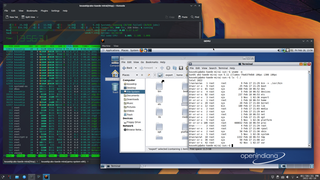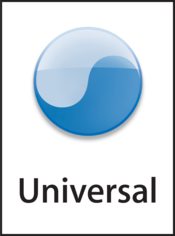
macOS, originally Mac OS X, previously shortened as OS X, is an operating system developed and marketed by Apple since 2001. It is the primary operating system for Apple's Mac computers. Within the market of desktop and laptop computers, it is the second most widely used desktop OS, after Microsoft Windows and ahead of all Linux distributions, including ChromeOS and SteamOS.
In computing, cross-platform software is computer software that is designed to work in several computing platforms. Some cross-platform software requires a separate build for each platform, but some can be directly run on any platform without special preparation, being written in an interpreted language or compiled to portable bytecode for which the interpreters or run-time packages are common or standard components of all supported platforms.
The history of macOS, Apple's current Mac operating system formerly named Mac OS X until 2011 and then OS X until 2016, began with the company's project to replace its "classic" Mac OS. That system, up to and including its final release Mac OS 9, was a direct descendant of the operating system Apple had used in its Mac computers since their introduction in 1984. However, the current macOS is a UNIX operating system built on technology that had been developed at NeXT from the 1980s until Apple purchased the company in early 1997.
In computer science, dynamic recompilation is a feature of some emulators and virtual machines, where the system may recompile some part of a program during execution. By compiling during execution, the system can tailor the generated code to reflect the program's run-time environment, and potentially produce more efficient code by exploiting information that is not available to a traditional static compiler.
MkLinux is an open-source software computer operating system begun by the Open Software Foundation Research Institute and Apple Computer in February 1996, to port Linux to the PowerPC platform, and Macintosh computers. The name refers to the Linux kernel being adapted to run as a server hosted on the Mach microkernel, version 3.0.
Star Trek is the code name that was given to a secret prototype project, running a port of Macintosh System 7 and its applications on Intel-compatible x86 personal computers. The project, starting in February 1992, was conceived in collaboration between Apple Computer, who provided the majority of engineers, and Novell, who at the time was one of the leaders of cross-platform file-servers. The plan was that Novell would market the resulting OS as a challenge to Microsoft Windows, but the project was discontinued in 1993 and never released, although components were reused in other projects. The project was named after the Star Trek science fiction franchise with the slogan "To boldly go where no Mac has gone before".
CodeWarrior is an integrated development environment (IDE) published by NXP Semiconductors for editing, compiling, and debugging software for several microcontrollers and microprocessors and digital signal controllers used in embedded systems.
Object Pascal is an extension to the programming language Pascal that provides object-oriented programming (OOP) features such as classes and methods.

QEMU is a free and open-source emulator that uses dynamic binary translation to emulate the processor of a computer. It provides a variety of hardware and device models for the machine, enabling it to run different guest operating systems. QEMU can be used in conjunction with Kernel-based Virtual Machine (KVM) to execute virtual machines at near-native speeds. Additionally, QEMU supports the emulation of user-level processes, allowing applications compiled for one processor architecture to run on another.

Rosetta is a dynamic binary translator developed by Apple Inc. for macOS, an application compatibility layer between different instruction set architectures. It enables a transition to newer hardware, by automatically translating software. The name is a reference to the Rosetta Stone, the artifact which enabled translation of Egyptian hieroglyphs.

The universal binary format is a format for executable files that run natively either on both PowerPC-based and x86-based Macs or on both Intel 64-based and ARM64-based Macs. The format originated on NeXTStep as "Multi-Architecture Binaries", and the concept is more generally known as a fat binary, as seen on Power Macintosh.
Dylan programming language history first introduces the history with a continuous text. The second section gives a timeline overview of the history and present several milestones and watersheds. The third section presents quotations related to the history of the Dylan programming language.
Apple Dylan is the original implementation of the programming language Dylan. It was developed by Apple Computer from 1992 to 1995.

FutureBasic is a free BASIC compiler for Apple Inc.'s Macintosh.
Clozure CL (CCL) is a Common Lisp implementation. It implements the full ANSI Common Lisp standard with several extensions. It contains a command line development environment, an experimental integrated development environment (IDE) for Mac OS X using the Hemlock editor, and can also be used with SLIME. Clozure CL is open source and the project is hosted by Clozure Associates.
The following outline of Apple Inc. is a topical guide to the products, history, retail stores, corporate acquisitions, and personnel under the purview of the American multinational corporation:
Absoft Corporation was an American software company active from 1980 to 2022. They were best known for their set of Fortran compilers for Microsoft Windows, Apple Macintosh, and Linux operating systems. The compilers are source code compatible across platforms.

Mac OS is the series of operating systems developed for the Macintosh family of personal computers by Apple Computer, Inc. from 1984 to 2001, starting with System 1 and ending with Mac OS 9. The Macintosh operating system is credited with having popularized the graphical user interface concept. It was included with every Macintosh that was sold during the era in which it was developed, and many updates to the system software were done in conjunction with the introduction of new Macintosh systems.
Comparison of user features of operating systems refers to a comparison of the general user features of major operating systems in a narrative format. It does not encompass a full exhaustive comparison or description of all technical details of all operating systems. It is a comparison of basic roles and the most prominent features. It also includes the most important features of the operating system's origins, historical development, and role.





